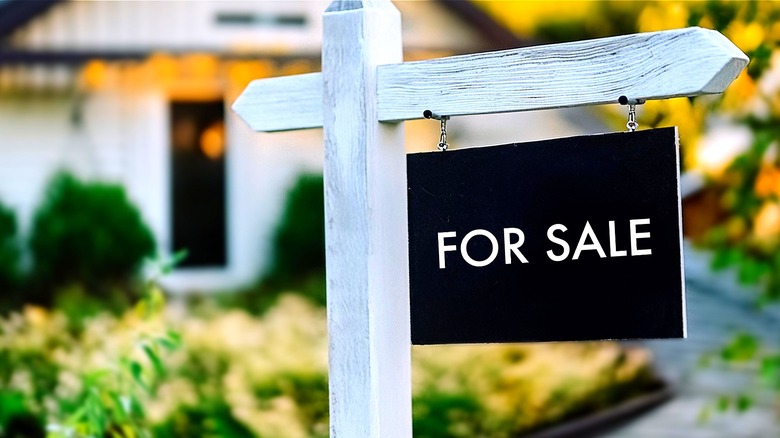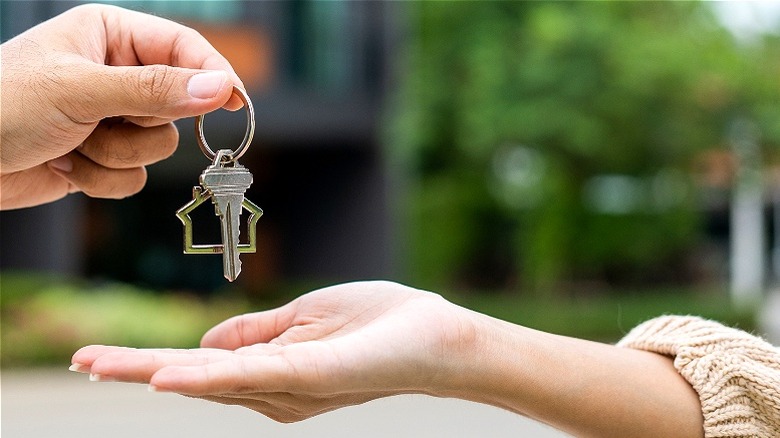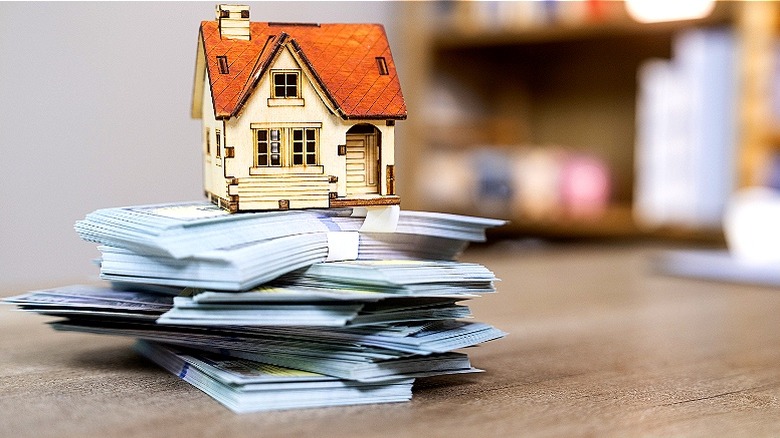Is Buying A House With Cash A Smart Money Move?
The process of buying a home can be a nerve-wracking one. It's a lot of responsibility to take on, homeownership, and it's a lot of money to raise and manage. If, like most Americans, you choose to finance your home purchase, your mortgage is likely to become the single largest bill you face every month. Shopping around for a mortgage is advisable, but that takes time. Refinancing down the line can be a confusing and potentially dangerous undertaking. What's more, many people don't live in one house long enough to pay it off. And that's all assuming you're approved for a mortgage in the first place, which can be an involved process with demanding conditions.
This said, financing remains the go-to way to buy a home even with the difficulties. But as of 2023, over a third of homebuyers — the highest figure in a decade — were opting for all-cash payments. In a high-interest-rate environment, cash buyers can enjoy certain advantages on their end; for one, they don't have to deal with high mortgage rates (e.g., here's how much difference 1% in a mortgage rate can cost you). For the seller, meanwhile, an all-cash payment can signify a serious buyer — one not likely to get lost on the road to a loan approval.
The convenience of all-cash payments when buying a house brings other incentives, too; however, there are also a few pitfalls to be aware of. Here are the pros and cons to buying a house with cash.
Paying with cash is simpler and often cheaper
One of the chief selling points for buying a house in cash is that it's much simpler than financing. Besides all the steps it takes to get approved for a loan, buyers who already have a mortgage on a home they're trying to sell themselves can be ineligible. And, if and when you do get one, mortgages come with additional costs, such as origination fees. Note that cash buyers do need to provide proof they have the ready funds, and it's advisable for those paying for a house in cash to consolidate it beforehand. But with cash, it's a much more straightforward and speedy process from making an offer to owning the house.
Buying a home with cash is also potentially a much cheaper one, and not just because it avoids hidden fees and the long-term interest that comes with financing. When you buy a home with cash, bargaining is more common; because the buyer has the funds ready, sellers tend to take their bid more seriously, giving the buyer room to negotiate for a lower price. That said, that's less true now than it was a few years ago, as the increase of buyers opting for all-cash purchases has cut down on competition. However, even if you end up meeting the seller's asking price, there's another benefit to paying in cash: You own the home outright, without any of the strings that come with financing. (Speaking of which, here are the things first-time homebuyers often get wrong about buying a house.)
The drawbacks of an all-cash payment
Sidestepping mortgages and paying for a house with cash is a simpler process for home buying that avoids ongoing payments with accumulating interest, but it comes with some drawbacks. Those who finance may be eligible for the mortgage interest deduction come tax time (and in fact, it's among the most important tax breaks you need to know). All-cash purchases don't get that deduction, and they don't get any relief in property taxes either.
All-cash buyers also miss out on the potential growth that those who finance can see. If you put down, say, 20% on a house that increases in value, you'll realize a much larger return on your initial investment than if you had paid the full price upfront. Of course, in that situation, the buyer who financed would be vulnerable if the house lost value over time.
If you look upon a house as an investment over a place to live, personalize, and raise a family in, then the biggest argument against an all-cash payment may be that doing so ties up too much of your money. Unless you're fabulously rich, an all-cash payment of a house is likely to be most, if not all, of your savings. This leaves you with very little liquidity in the event of an emergency.


